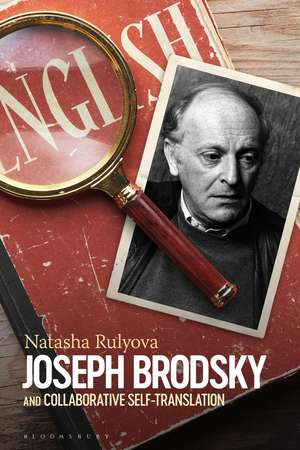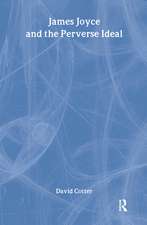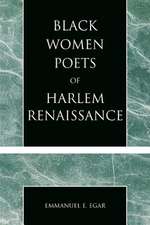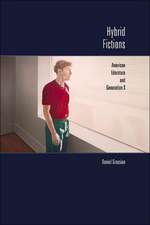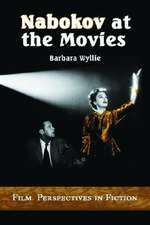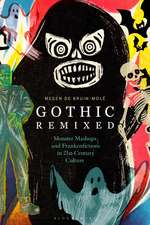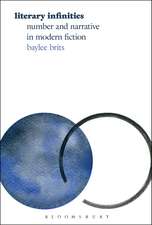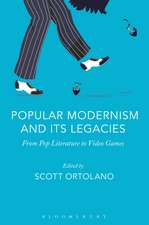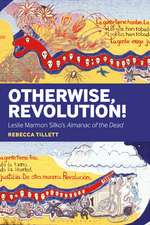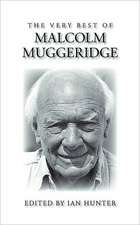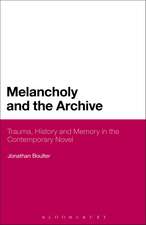Joseph Brodsky and Collaborative Self-Translation
Autor Dr. Natasha Rulyovaen Limba Engleză Hardback – 11 noi 2020
| Toate formatele și edițiile | Preț | Express |
|---|---|---|
| Paperback (1) | 196.96 lei 6-8 săpt. | |
| Bloomsbury Publishing – 18 mai 2022 | 196.96 lei 6-8 săpt. | |
| Hardback (1) | 655.82 lei 6-8 săpt. | |
| Bloomsbury Publishing – 11 noi 2020 | 655.82 lei 6-8 săpt. |
Preț: 655.82 lei
Preț vechi: 942.72 lei
-30% Nou
Puncte Express: 984
Preț estimativ în valută:
125.51€ • 130.04$ • 104.74£
125.51€ • 130.04$ • 104.74£
Carte tipărită la comandă
Livrare economică 22 martie-05 aprilie
Preluare comenzi: 021 569.72.76
Specificații
ISBN-13: 9781501363924
ISBN-10: 1501363921
Pagini: 216
Dimensiuni: 152 x 229 x 21 mm
Greutate: 0.46 kg
Editura: Bloomsbury Publishing
Colecția Bloomsbury Academic
Locul publicării:New York, United States
ISBN-10: 1501363921
Pagini: 216
Dimensiuni: 152 x 229 x 21 mm
Greutate: 0.46 kg
Editura: Bloomsbury Publishing
Colecția Bloomsbury Academic
Locul publicării:New York, United States
Caracteristici
Brings new light to our understanding of authenticity, originality and authorship by demonstrating that the author's authentic writing style in the second language develops in response to and in collaboration with native speaking translators, peer poets, editors and friends
Notă biografică
Natasha Rulyova is Lecturer in Russian at the University of Birmingham, UK, where she leads the Russian Studies programme and teaches Russian language, Russian literature and translation.
Cuprins
Introduction: Brodsky's Self-Translation Project 1. Collaborative Self-Translation2. Competing Translations3. Self-Translation Networks 4. Writing in English Conclusion BibliographyIndex
Recenzii
Natasha Rulyova's richly detailed study, Joseph Brodsky and Collaborative Self-Translation ... presents a densely theorized account that will speak particularly to translation studies scholars. ... The best parts [are] when Rulyova tracks the collaborative translation work in specific cases, based on materials she unearthed in several archives. She is tireless as a researcher and the book is packed with lengthy quotations from letters Brodsky received from his translators, and letters he sent to them about their work. Elaborate charts show the multiple versions of poems on which several people worked. ... Later researchers will find an immense amount to work with.
Rulyova's study is grounded in an understanding of Brodsky's distinctive perspective, that of a poet who operated in between two languages and two literary cultures ... Her work presents a persuasive case for the study of self-translation, and for understanding the specific challenges Brodsky faced as a 'late bilingual'.
Now I've read the MS, very much enjoying the detailed unpacking of the complex processes of collaborative translation that Natasha has produced. Here are some thoughts: "Combative collaboration" is an appropriate description for the working out of a process in which power was distributed unevenly between the poet, who was prepared to insist on his own linguistic choices in preference to the more idiomatic choices of his translators. It was, as Rulyova shows, a fluid process in which collaboration, between the poet and his translators, and sometimes between individual translators, might be understood rather differently by those engaged in it. Painstaking archival research allows Rulyova to track the evolution of Brodsky's collaborative translations, in which elements of individual translators' versions were merged with the poet's own translations. The author, with an admirably light touch, guides us through the intercultural space in which Brodsky and his translators met, tussled, negotiated, and created. Rulyova succeeds in showing how collaborative translation allowed Brodsky to curate his own authentic English voice.
Unearthing much new material, Rulyova delves into the fascinating complexities of collaboration, producing surprising insights.
Rulyova's study is grounded in an understanding of Brodsky's distinctive perspective, that of a poet who operated in between two languages and two literary cultures ... Her work presents a persuasive case for the study of self-translation, and for understanding the specific challenges Brodsky faced as a 'late bilingual'.
Now I've read the MS, very much enjoying the detailed unpacking of the complex processes of collaborative translation that Natasha has produced. Here are some thoughts: "Combative collaboration" is an appropriate description for the working out of a process in which power was distributed unevenly between the poet, who was prepared to insist on his own linguistic choices in preference to the more idiomatic choices of his translators. It was, as Rulyova shows, a fluid process in which collaboration, between the poet and his translators, and sometimes between individual translators, might be understood rather differently by those engaged in it. Painstaking archival research allows Rulyova to track the evolution of Brodsky's collaborative translations, in which elements of individual translators' versions were merged with the poet's own translations. The author, with an admirably light touch, guides us through the intercultural space in which Brodsky and his translators met, tussled, negotiated, and created. Rulyova succeeds in showing how collaborative translation allowed Brodsky to curate his own authentic English voice.
Unearthing much new material, Rulyova delves into the fascinating complexities of collaboration, producing surprising insights.
